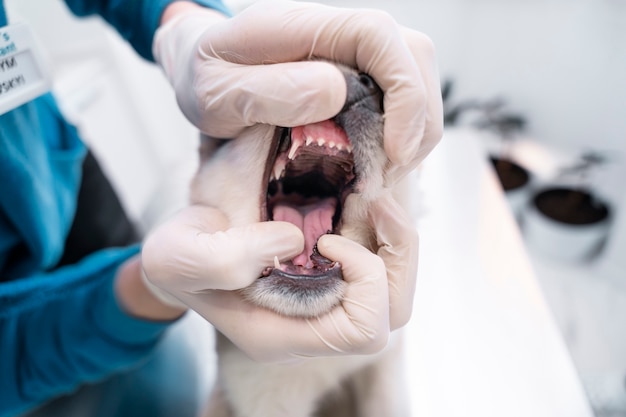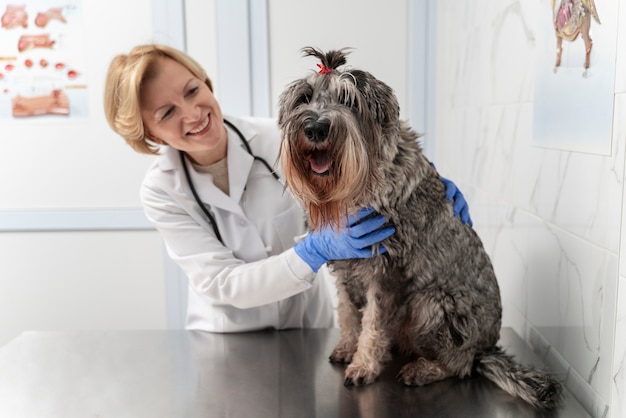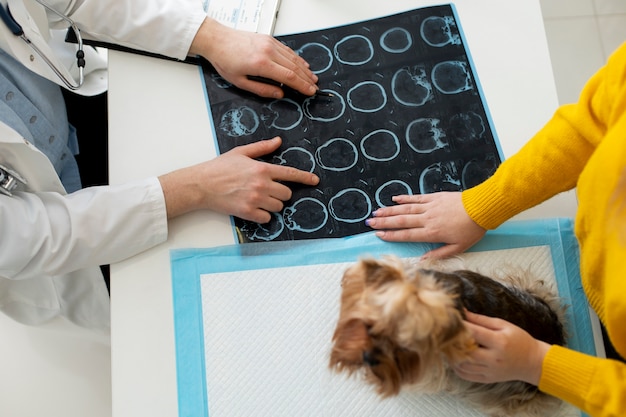How to Recognize Signs of Dental Pain in Pets

How to Recognize Signs of Dental Pain in Pets
If you have ever noticed your dog or cat pawing at their mouth, turning away from their food, or acting differently around mealtimes, you might wonder if dental pain is the culprit. Dental discomfort is one of the most common and under-recognized health issues in pets. At Liberty Veterinary Clinic, located at 8919 Ridge Avenue, Philadelphia, PA 19128, our veterinary team is dedicated to helping pet families in Philadelphia and surrounding communities stay proactive about oral health. Recognizing early pet dental pain symptoms can make a world of difference for your pet’s comfort and long-term health.
In this post, we’ll guide you through the most common signs of tooth problems in pets, discuss what causes dental pain, review professional and home care solutions, and clarify when it’s time to schedule a visit with our veterinarians. If you’re searching for a dental vet near me or want to know more about dental care in Philadelphia, you’re in the right place. For pet owners who are ready to take the next step, our dental cleaning services for pets can help ensure your pet’s smile stays healthy and pain-free.
Recognizing Pet Dental Pain Symptoms: What to Watch for
Dental pain in pets often develops slowly, making it easy for subtle symptoms to be overlooked. Unlike people, our furry friends can’t tell us when their teeth hurt, so it’s up to us to notice the warning signs. Common pet dental pain symptoms include changes in eating habits such as dropping food, chewing on one side, or reluctance to eat hard kibble. You may also notice pawing at the mouth, excessive drooling, or a sudden interest in chewing on unusual objects.
Other red flags can be bad breath that persists despite regular brushing, swelling around the face or jaw, and visible bleeding from the gums. Some pets become withdrawn or irritable, avoiding playtime or snapping when their mouth area is touched. In certain cases, pets may lose weight or develop a shabby coat due to reduced grooming. These signs of tooth problems in pets can appear gradually, so staying alert to small changes is essential.
Behavioral and Physical Cues
Pets experiencing dental discomfort sometimes become less social or hide more often. Cats, in particular, may stop grooming themselves, which can lead to a dull or matted coat. Dogs might whimper or shy away when their face is stroked. Additionally, you might observe visible tartar, red gums, or loose teeth during at-home mouth inspections. If you notice any of these signs, it is important to consider professional dental evaluation in Philadelphia to prevent further complications.
What Causes Dental Pain in Dogs and Cats?
Understanding the root of dental pain helps pet owners appreciate the importance of preventive care. Most dental pain in pets is caused by periodontal disease, which is a progressive infection of the gums and supporting structures of the teeth. Plaque and tartar build up over time, leading to inflammation, infection, and eventually, tooth loss if left untreated.
Other causes include fractured teeth from chewing on hard objects, retained baby teeth in young pets, oral tumors, or abscesses due to bacterial infections. Certain breeds are more prone to dental issues, such as small dogs and flat-faced cats, due to the structure of their jaws and teeth. Nutritional factors, immune system health, and pre-existing medical conditions can also influence how quickly dental disease develops.
Philadelphia’s climate, with its seasonal shifts, can sometimes lead to changes in your pet’s routine that affect dental health. For example, pets may chew on ice or sticks more frequently during outdoor play, raising the risk of broken teeth. These local factors highlight the importance of seeking veterinary dental care in Philadelphia and surrounding areas to keep your pet healthy year-round.
Why Dental Pain Often Goes Unnoticed
Pets are instinctively inclined to hide discomfort, especially pain caused by dental issues. In the wild, showing weakness could put them at risk, so cats and dogs may mask their symptoms until the condition becomes severe. This natural tendency makes it even more important for owners to be proactive about regular dental check-ups in Philadelphia.
Professional Treatment for Dental Problems in Pets
When your pet is exhibiting symptoms like those described above, professional dental care is the most reliable way to diagnose and treat the issue. At Liberty Veterinary Clinic, our veterinarians use advanced diagnostic tools, such as dental X-rays and radiography for pets, to detect hidden tooth problems that can’t be seen during a visual exam. Dental radiographs are essential for revealing issues below the gum line, such as root infections or bone loss.
Treatment options in Philadelphia involve thorough dental cleanings under anesthesia, which allow the veterinary team to remove plaque and tartar safely and efficiently. In cases where a tooth is severely damaged or infected, our team may recommend pet tooth extraction services to restore your pet’s comfort and prevent further infection. After treatment, pets often show remarkable improvements in appetite, energy, and overall wellbeing.
The Dental Cleaning Process
A comprehensive dental cleaning for pets begins with a full oral examination and digital radiographs to assess the extent of disease. The veterinary team then removes all tartar and plaque, both above and below the gum line, followed by polishing to smooth the tooth surfaces. Any necessary extractions are performed with attention to minimizing discomfort and promoting quick recovery. Post-procedure care instructions are provided to help ensure a smooth healing process at home.
Preventing Dental Disease: Home Care and Routine Maintenance
While professional dental services are essential, there is much pet owners can do at home to help prevent dental pain. Brushing your pet’s teeth daily with veterinary-approved toothpaste is the gold standard for at-home care. Dental chews, water additives, and certain diets formulated for oral health can also reduce plaque buildup. Regularly inspecting your pet’s mouth for redness, swelling, or chipped teeth helps you catch problems early.
Scheduling routine dental cleaning services for pets in Philadelphia is an effective way to prevent severe dental disease. Our veterinarians can guide you in choosing the best home care products and techniques tailored to your pet’s individual needs and lifestyle. Establishing these habits when pets are young makes ongoing oral care much easier as they age.
Encouraging Positive Dental Habits
Introducing dental care gradually, using treats and praise, can help pets become comfortable with brushing and mouth inspections. If your pet resists at first, start by simply touching their muzzle and lips, gradually working up to gentle brushing sessions. Consistency and patience are key to making dental care a positive experience for both you and your pet.
When to Seek Veterinary Dental Care in Philadelphia
Knowing when to seek professional care is crucial to preventing more serious health problems. If you notice symptoms such as persistent bad breath, visible bleeding, loose or missing teeth, facial swelling, or significant changes in eating habits, it’s time to schedule a consultation with our veterinary team. Sudden changes in behavior, like hiding or aggression when touched near the mouth, also indicate the need for prompt evaluation.
Delaying care can lead to advanced periodontal disease, which not only causes pain but can also impact your pet’s heart, liver, and kidneys through bacteria entering the bloodstream. Our veterinarians at Liberty Veterinary Clinic are committed to providing comprehensive dental care in Philadelphia and supporting pet owners every step of the way.
If you are searching for a "vet near me" or "dental vet near me," our clinic offers convenient access to professional dental services for pets in Philadelphia and the nearby region. Whether it’s time for a check-up, cleaning, or more advanced dental procedures, our team is here to help.
Disclaimer
This article is intended for informational purposes only and should not replace professional veterinary advice. Always consult your veterinarian for diagnosis and treatment tailored to your pet’s specific needs.
Take Charge of Your Pet’s Oral Health Today
Your pet’s comfort and happiness are closely linked to their dental health. By recognizing pet dental pain symptoms and staying vigilant for signs of tooth problems in pets, you can take proactive steps to keep them healthy and pain-free. Our team of veterinarians at Liberty Veterinary Clinic is proud to offer comprehensive dental care in Philadelphia, using advanced diagnostics and compassionate treatment to support your pet’s wellbeing.
If you suspect your dog or cat may be experiencing dental pain, or if it’s simply time for a professional cleaning, we encourage you to schedule an appointment by calling (215) 483-1066. Our team will work with you to develop a personalized plan for maintaining your pet’s oral health, whether you need preventive dental cleaning services for pets or advanced diagnostic imaging with dental X-rays and radiography for pets.
For the best care from a "vet near me" and to ensure your pet’s dental health is in expert hands, visit us at 8919 Ridge Avenue, Philadelphia, PA 19128. We’re here to help pets in Philadelphia and surrounding communities enjoy bright smiles and healthy lives for years to come.


















